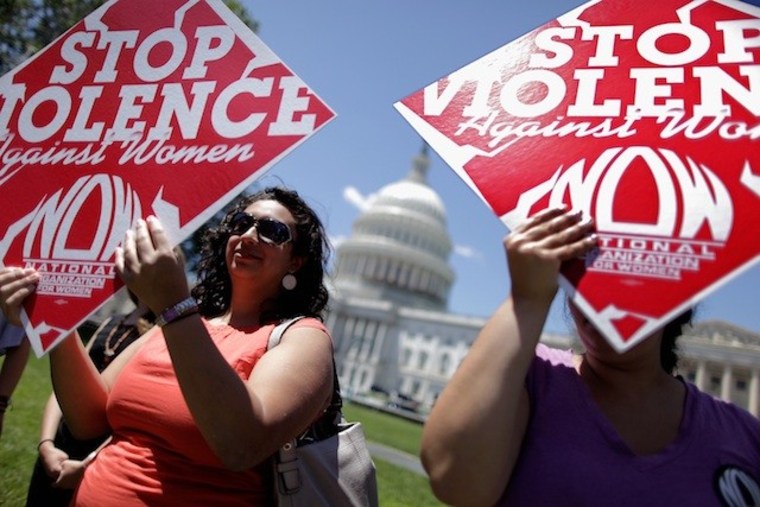Among its first order of business, the newly sworn in 113th Congress is trying yet again to expand protections for women across the country. Who knew it would prove so difficult?
On Tuesday, Sen. Mike Crapo, R—Idaho, and Sen. Patrick Leahy, D—Vermont, reintroduced the reauthorization of the Violence Against Women Act.
VAWA, which aims to protect victims of rape and domestic abuse, was allowed to expire late last year by the 112th Congress after the Senate reauthorized the measure with bipartisan support, but the GOP-led House refused to sign off on it.
Instead, House Republicans unsuccessfully tried to push their own watered-down version of the bill which controversially excluded three key groups that are especially vulnerable to sexual and domestic violence—Native American women, immigrant women, and members of the LGBT community.
For many House Republicans, the most contentious portion of the bill dealt with the increased number of visas for undocumented victims of domestic violence.
The Senate-passed version of VAWA would have worked toward encouraging victims to report their attackers by granting them temporary legal status in the form of "U-visas." Right now the number of visas allowed are capped at 10,000 per year.
The visas also serve as a source of revenue because there is an application fee associated with them. But that is precisely where House Republicans have taken issue. According to the Constitution, bills that raise revenue must originate in the House, not the Senate.
The newest version of the bill resolves the GOP's procedural objection by removing the section aimed at increasing the number of visas, but that still doesn't mean the House will get behind it. Many reports claim that House Republicans also take issue with the portion aimed at protecting Native American women from violence.
In a statement released Tuesday, Sen. Patty Murray, D—Washington, urged the House to rethink their position on the bill.
“The fate of the Violence Against Women Act still lays squarely on the shoulders of Eric Cantor and John Boehner. To date they have refused to listen to countless law enforcement and women’s groups as well as moderate voices in their own party in the House and Senate who’ve said we need to pass the Senate’s bipartisan bill that extends protections to millions of new women.“In a new Congress, on a newly reintroduced bill, the House Republican leadership faces the same choice. They can either kowtow [to] those on the far right of their caucus who would turn battered women away from care, or they can stand with Democrats, moderate Republicans, and the many millions of Americans who believe that who a person loves, where they live, or their immigration status shouldn’t determine whether they are protected from violence. “In the days ahead, I encourage the moderate Republican voices in the House to call on their leadership to pass the bipartisan Senate bill. Too many women have been left vulnerable while House Republican leaders have played politics.”
But until Congress reaches an agreement on this measure, countless innocent women will remain in harm's way with few places to turn for assistance.
